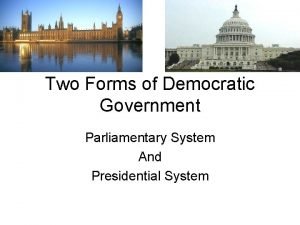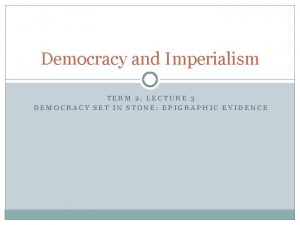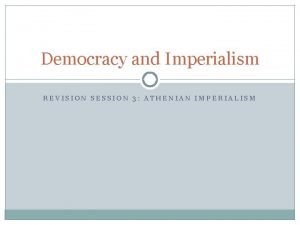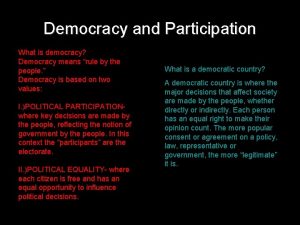Democracy and Imperialism LECTURE 1 INTRODUCTION ROEL KONIJNENDIJK
















- Slides: 16

Democracy and Imperialism LECTURE 1: INTRODUCTION ROEL KONIJNENDIJK Room 234, Humanities building r. konijnendijk@warwick. ac. uk

Module outline � Lectures: every Friday, 3 -5 pm, R 0. 12 � Seminars: weeks 5 and 8, groups to be determined � Language sessions (Q 800 students): every Tuesday, 4 -5 pm, H 2. 45 � Essay: Term 1 deadline Tuesday 14 November � Exam in Term 3

What are we talking about? �Democracy? �Imperialism? Module theme: the origins, nature, and legacy of the democracy of Classical Athens (508 -322 BC)

A matter of perspective �First known use of demokratia: Herodotus 6. 131. 1 (c. 430) �Greek political writing & expression is (Athenian) retrospective �‘Imperialism’: no Greek word for empire!

Power to the People The rule of the multitude has in the first place the loveliest name of all: equality. In the second place, the people do none of the evil things that monarchs do. Officials hold office by lot, and their conduct is subject to examination, and all measures are referred to the popular assembly. Herodotus 3. 80. 6 The popular principle of justice is to have equality according to number, not worth, and if this is the principle of justice prevailing, the multitude must of necessity be sovereign and the decision of the majority must be final and must constitute justice, for they say that each of the citizens ought to have an equal share; so that it results that in democracies the poor are more powerful than the rich, because there are more of them, and whatever is decided by the majority is sovereign. Aristotle, Politics 1317 b. 3 -10

What is Athenian democracy? �Supreme authority of the Assembly �Offices assigned by lot for short periods �Magistrates held accountable �Payment for public duties �Equality?

The first Greek empire? And the first person known to us by tradition as having established a navy is Minos. He made himself master of what is now called the Aegean, and ruled over the Cyclades, into most of which he sent the first colonies, expelling the Carians and appointing his own sons governors; and thus did his best to put down piracy in those waters, a necessary step to secure the revenues for his own use. (…) As soon as Minos had formed his navy, communication by sea became easier, as he colonized most of the islands, and thus expelled the evildoers. The coast populations now began to apply themselves more closely to the acquisition of wealth, and their life became more settled; some even began to build themselves walls on the strength of their newly-acquired riches. For the love of gain would reconcile the weaker to the dominion of the stronger, and the possession of capital enabled the more powerful to reduce the smaller towns to subjection. Thucydides 1. 4 and 1. 8. 2 -3

What is Athenian imperialism? �Power over other communities �Control of the sea/control of trade �Extraction of revenue from subjects �Establishing ‘colonies’ overseas �Mutual benefit?

The origins of democracy �Democracy did not appear out of nowhere �Democracy did not arise fully formed �The rise of democracy was no inevitable process

What is good government? The Cyclopes (…) have no assembly, no code of law, but live in echoing caves on the mountain slopes, and each man lays down the law to his wives and children, and cares nothing for one another. Homer, Odyssey 9. 106 -115 And there is the maiden Justice (Dikē), the daughter of Zeus, who is honoured and revered among the gods who dwell on Olympus, and whenever anyone hurts her with lying slander, she sits beside her father, Zeus the son of Cronos, and tells him of men's wicked minds, until the people pay for the mad folly of their basileis who, thinking evil thoughts, pervert judgement and speak crooked justice. Keep watch against this, you basileis, and make straight your judgements, you gift-eaters (dōrophagoi); put crooked judgements altogether from your thoughts. Hesiod, Works and Days 256 -264

Early Archaic government �Earliest literary texts reveal hierarchy dominated by ‘kings’ (basileis) but tempered by Assembly �Kingship not hereditary, but based on wealth & prominence in counsel and war �From 8 th century onward: population growth, increased trade, reintroduction of writing, overseas settlement – all put pressure on the ‘kings’!

Was democracy born in war? And indeed the earliest form of constitution among the Greeks after the kingships consisted of those who were actually warriors, the original form consisting of the cavalry, (…) but as the states grew and the hoplites had become stronger, more persons came to have a part in the government. Aristotle, Politics 1297 b. 16 -24

Early signs of people power �Law from Dreros (Crete), second half of 7 th century: “it pleases the polis…” �Foundation of Cyrene, late 7 th century: the people decide? �‘People’s Council’ (boulē demōsiē) on Chios, c. 550 �Spartan ‘Great Rhetra’: democracy or not?

Tyrants: friends of the people? And moreover, because cities in those times were not large but the common people lived in the country and worked their farms, the people's champions, when they became warlike, used to aim at tyranny. And they all used to do this when they had acquired the confidence of the people, and their pledge of confidence was their enmity towards the rich. Aristotle, Politics 1305 a. 19 -23 [Kypselos] was soon especially admired by the citizens, as he was brave and sensible and seemed to have the popular interest at heart. (…) Finally having formed an entourage he killed the ruler Hippokleides who was lawless and oppressive. And the people quickly set him up as king in his stead. Nicolaus of Damascus fr. 57. 4 -6 The nobles are in exile, the base manage the city. If only Zeus would destroy the clan of the Kypselids! Theognis 893 -894

Athens says no to tyranny � 632/1: Cylon, Olympic victor & son-in-law of Theagenes, the tyrant of Megara, gathers a hetaireia and stages a coup �Cylon’s attempt fails when the people intervene �Murder of Cylon’s allies brings a curse on the powerful clan of the Alcmeonids �Civil strife continues. Athenians assign Draco to write new laws

Key questions �What are the forces that drove the emergence of democracy in the ancient Greek world? �To what extent was Athens different from other Greek poleis in the early Archaic period? �To what extent do you think democracy was the likely outcome of the changing nature of Greek society at this time?
 Roel konijnendijk,
Roel konijnendijk, Roel konijnendijk wikipedia
Roel konijnendijk wikipedia Roel konijnendijk
Roel konijnendijk Roel konijnendijk
Roel konijnendijk Old imperialism examples
Old imperialism examples Old imperialism vs new imperialism
Old imperialism vs new imperialism Presidential system
Presidential system 01:640:244 lecture notes - lecture 15: plat, idah, farad
01:640:244 lecture notes - lecture 15: plat, idah, farad Roel gootzen
Roel gootzen Plan van aanpak stappenplan
Plan van aanpak stappenplan Tussenresultaten plan van aanpak
Tussenresultaten plan van aanpak Roel pieters
Roel pieters Roel grit plan van aanpak
Roel grit plan van aanpak Roel pieper
Roel pieper Roel voorspoels
Roel voorspoels Roel pieper
Roel pieper Huysmans bouw
Huysmans bouw































